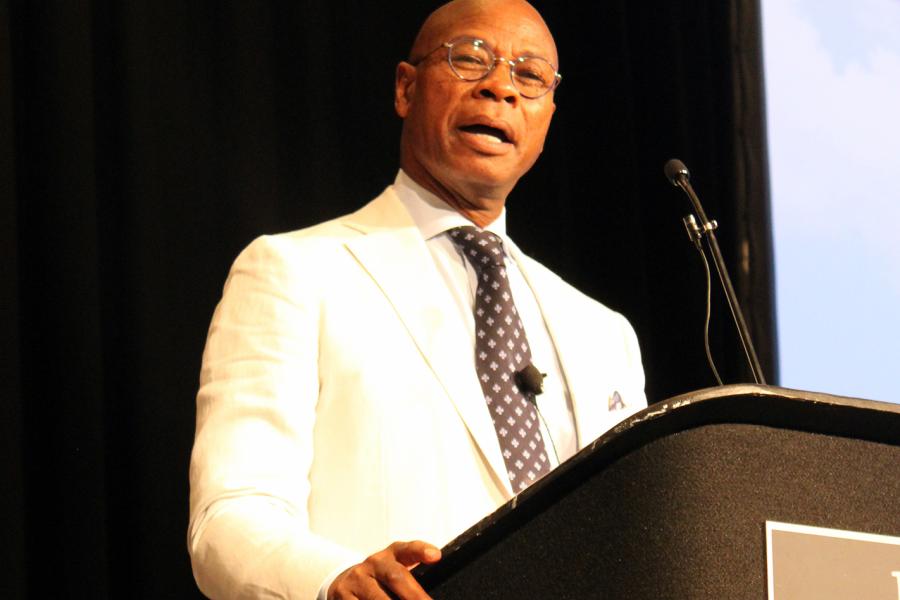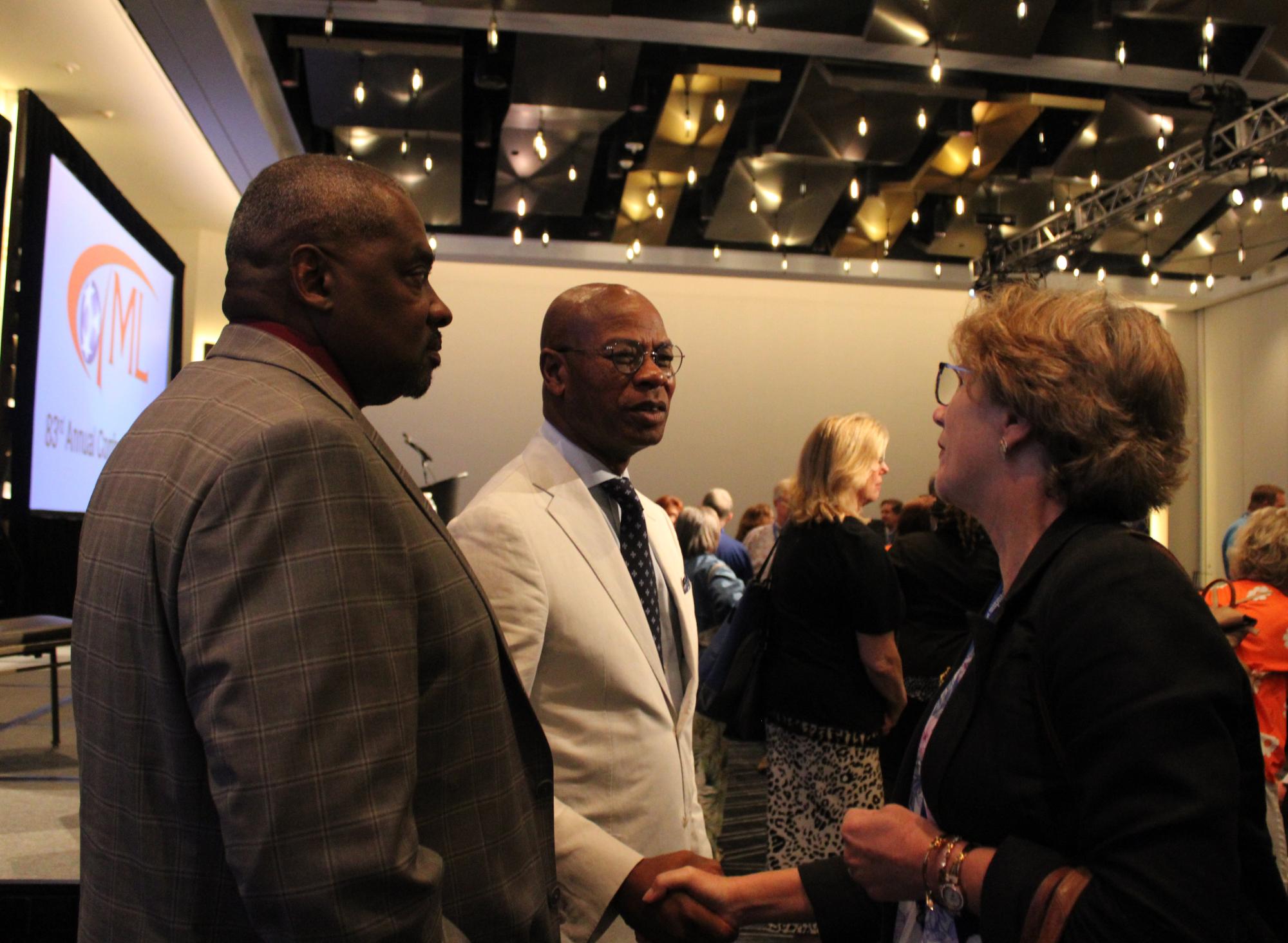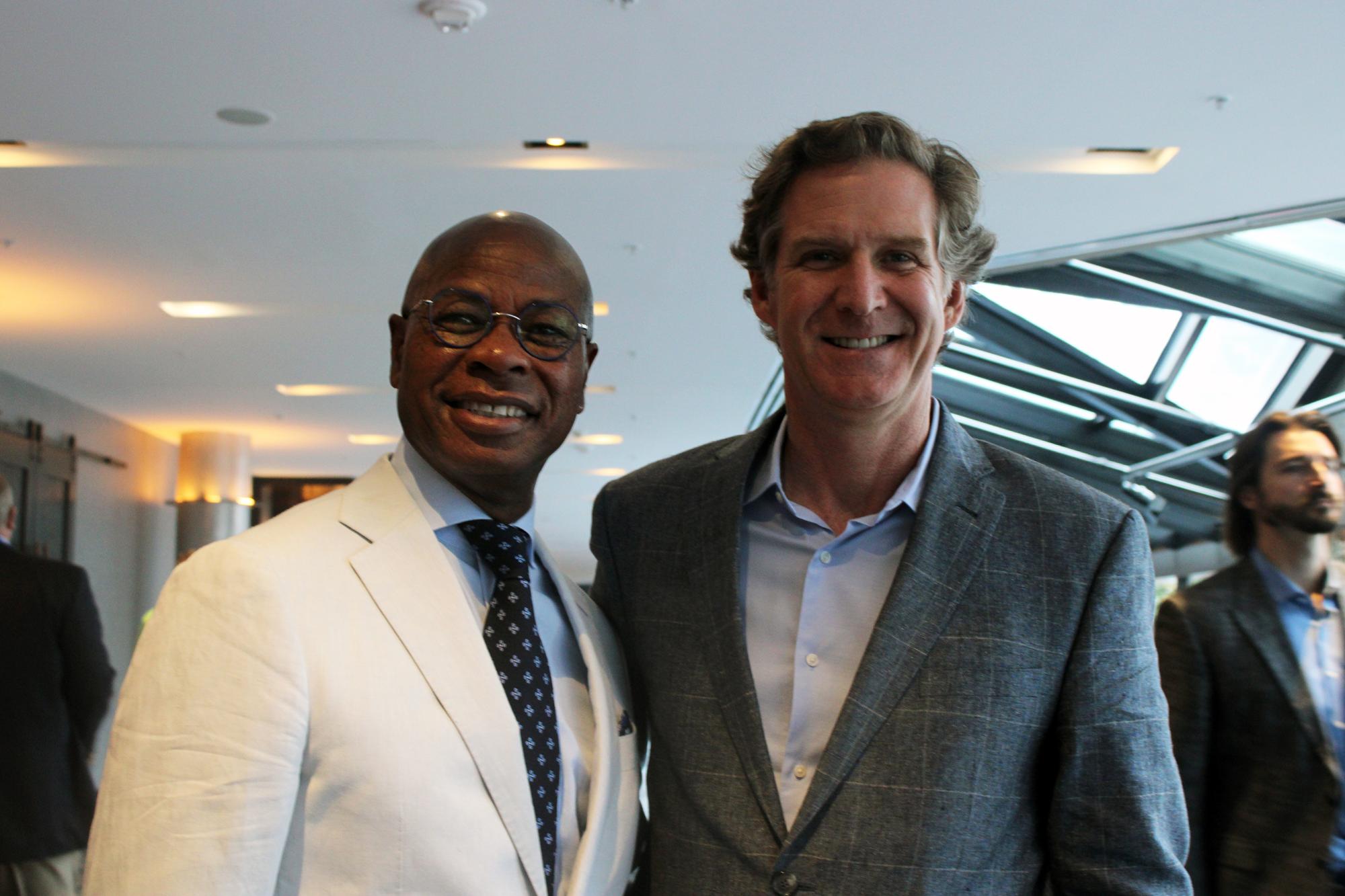NLC's Clarence Anthony calls on city officials to lead with purpose

By KATE COIL
TML Communications Specialist
National League of Cities Executive Director Clarence Anthony delivered remarks on the important role local civic leaders play in solving national problems and restoring unity at the Tennessee Municipal League’s 83rd Annual Conference in Nashville.
After returning from college, Anthony ran for mayor of South Bay, Fla., a position he held for 24 years. He recalled what prompted him to first run for office.
“I looked at this place that I left, and it wasn’t the same,” he said. “In five years, crime had risen. We also saw drug trafficking increase right down the street from where I grew up. I went to the city commission and got up during the public comments. I told them what was happening on my mother’s street. The mayor listened to me, shook his head, and told me ‘Mr. Anthony, we have a lot going on. We’ll get to your issue at a certain point, but we have a lot going on.’ And that was the start of my political career, because I just said my mother told me there is a problem on her street, and my mayor just told me he’s not going to deal with that problem.”

Following his election, Anthony said he dealt with the issue that made him run in the first place but soon found there were other issues the city needed to address that he had no background in. As a result, Anthony said he joined first his state league and then the National League of Cities.
“It helped me become a better leader, a more informed leader,” Anthony said. “I was able to go to Washington and lobby on behalf of my small city of 9,000 people. I encourage you to utilize TML as much as you can to get the education, to learn the best practices, to support Anthony (Haynes), and to be able to go to the Hill. With 345 cities and towns in this state, you guys should be the most powerful lobbying group that anyone has in this state. Why? Because you have the residents behind you. You were all elected, and most often we don’t recognize the power. The easy part is getting elected; the hard part is governing.”
As the world shut down due to the pandemic, Anthony said local leaders were the ones making sure essential services were up and running – often taking on thankless work to do so.
“I want you to recognize what you did in order to help America rebound and reimagine, because we are not the same communities and not the same leaders we were because of what we went through,” he said. “I know personally what it was like watching people that I love pass, helping the elderly during that time be able to get food, and also making sure your communities continued to provide services to their residents -- and a lot of people don’t say thank you. When city halls closed and streets were vacant, they looked to you – as local leaders. You carried that heavy burden of making sure your communities had what they needed.”
Anthony said the changes wrought by the pandemic give municipal officials both the opportunity and responsibility to chart a new way forward.
“This is our opportunity as local leaders to continue to lead,” he said. “As we look across America, what we’re seeing is that we need to be even stronger leaders because there is so much divisiveness among us. We need to make sure that America keeps its promise to its residents.”
Coming out of the pandemic, Anthony said local leaders are going to need to be open to their citizens but also have the data and information to back up decisions they make.
“As we look toward the rest of this reimagination of our communities, there is going to be a certain type of leader that we need,” he said. “We are going to need leaders who really respect their residents in a really dignified way no matter their race, their culture, or economic background. In the future, we need leaders who will love everyone in their community even if they don’t agree with them. We need leaders who are educated, who read and have data in front of them to make decisions. If we are continuing to lead our communities into the next generation, we are going to need leaders who are going to take risks. We need folks that are inspired about what they do every day. We need leaders who remember why they ran. If you don’t have that, you need to go back and remind yourself why you ran for office. Finally, we need leaders who lead with purpose.”
To help with the recovery and changes brought by the pandemic, NLC worked with lawmakers from both sides of the aisle to secure CARES Act funding, the Bipartisan Infrastructure Law, and helped secure $65.1 billion for local governments in ARP funds. He advised local leaders to use these funds
“These funds are going to you all to deal with the gaps that exist because of the pandemic,” he said. “I emphasize gap because these are one-time dollars. I don’t want you to create anything that is going to be recurring expenses on your community. Deal with those issues that you didn’t have the money to deal with before. I think that if we look at it that way, all our communities will be better. These dollars are coming down for the first time in the history of America. We want to make sure, however you use those dollars, you use them appropriately and tell the story of how you used those dollars to make your community better.”

In addition to filing potholes, replacing bridges, and adding water and wastewater infrastructure, Anthony encouraged city leaders to also frame how they are using the funding in terms of creating jobs in the community, improving systems, and bettering life for citizens. For smaller and rural municipalities, Anthony encouraged investment in technology – particularly broadband – as it is an essential service.
Anthony said he foresees four major issues coming into focus for local leaders: affordable housing, drug addiction and the abuse of drugs like opioids and fentanyl, public safety, and pre-emption.
He challenged city officials to tackle issues like housing quality and quantity.
“It’s not just affordability; it’s quality of housing,” Anthony said. “We encourage our kids to come back after they’ve gone to college or started their families, but they don’t have any place to live. Let’s focus on that.”
He also encouraged leaders to put aside stigma to address issues relating to addiction and not to turn a blind eye to the problem.
“If we all look around our communities right now, unfortunately we know someone who has overdosed or been impacted by opioids,” he said. “And this is not just an issue for adults. We’re seeing middle school kids die in America. We as local leaders have to tackle that issue using data and information.”
Perhaps the most challenging issue, Anthony admitted he himself was not sure how to move forward on concerns facing public safety but said he firmly believed local leaders could find solutions.
“I can talk about affordable housing and transportation, but the public safety and mass shooting issues around America is something we have to figure out how we can address as municipal officials. There is no better group to get around the table to talk about these issues and to work to solve these issues.”
Anthony said he has an “old school” approach to pre-emption from when he was mayor of South Bay.
“My citizens trusted me to make the decisions to ensure what happened in our community reflected what we wanted for our community,” he said. “That’s what you have. You have that authority, that right, that mandate by your citizens to advocate for them on the issues that they care about. What we are seeing around America – and even just this year there have been 600 preemption bills filed from January to June 1.”
He encouraged city leaders to fight bills that limit local authority.
“What they are doing is taking away your ability to make decisions for your residents. It may be on housing, public safety, governance, or any issue. All of those are the issues you should have responsibility for. Local authority and local home-rule is the bedrock of local government. We cannot legislate from the capitals of our nation what needs to happen in local cities.”
